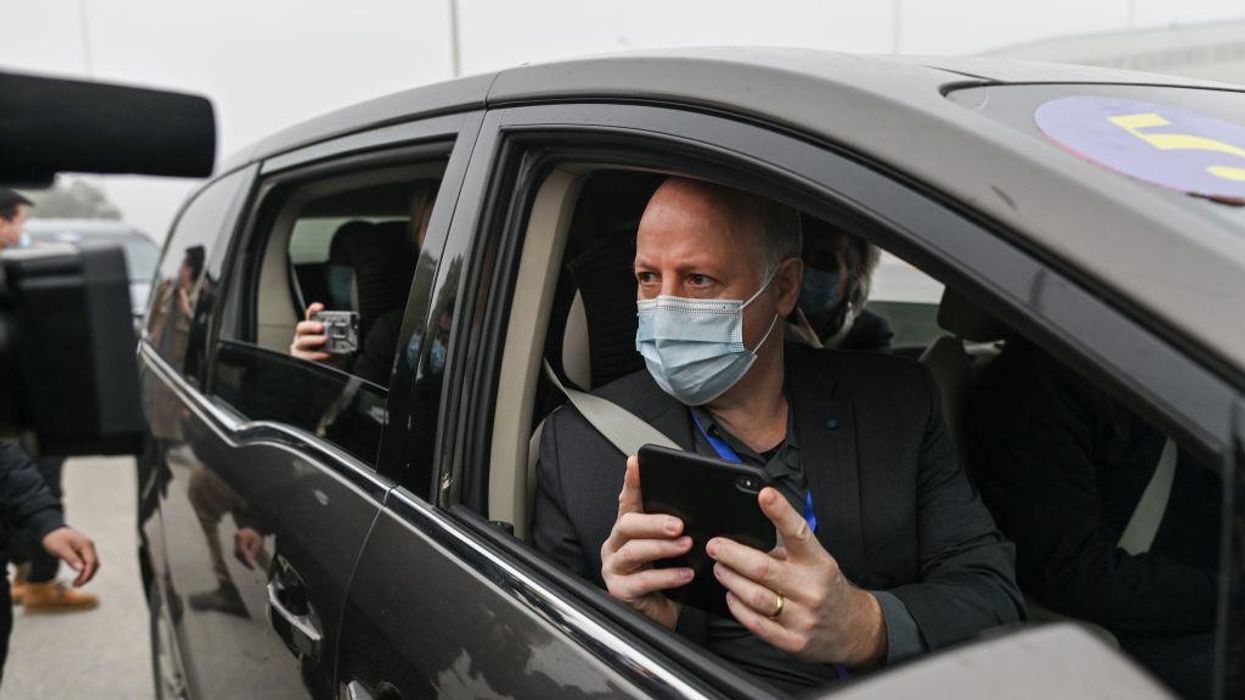
EcoHealth Alliance President Peter Daszak (HECTOR RETAMAL/AFP via Getty Images)

Twenty-four of the 27 prominent public health scientists who were signatories of an influential letter that condemned the COVID-19 lab-leak hypothesis as a "conspiracy theory" have signed a new statement doubling down on their claims that the SARS-CoV-2 virus originated in nature.
The new letter published in the Lancet on Monday asserted that there is no "scientifically validated evidence that directly supports" the lab-leak hypothesis while "new, credible, and peer-reviewed evidence" cited suggests "that the virus evolved in nature." The letter also defended the "integrity" of Chinese scientists working at the Wuhan Institute of Virology, some of whom have been accused of deleting key data that could help identify the origins of the SARS-CoV-2 virus.
"On Feb 19, 2020, we, a group of physicians, veterinarians, epidemiologists, virologists, biologists, ecologists, and public health experts from around the world, joined together to express solidarity with our professional colleagues in China," the letter began. "Unsubstantiated allegations were being raised about the source of the COVID-19 outbreak and the integrity of our peers who were diligently working to learn more about the newly recognised virus, SARS-CoV-2, while struggling to care for the many patients admitted to hospital with severe illness in Wuhan and elsewhere in China.
"Recently, many of us have individually received inquiries asking whether we still support what we said in early 2020," the scientists wrote. "The answer is clear: we reaffirm our expression of solidarity with those in China who confronted the outbreak then, and the many health professionals around the world who have since worked to exhaustion, and at personal risk, in the relentless and continuing battle against this virus."
Among the signatories is EcoHealth Alliance President Peter Daszak, who's nonprofit organization provided the Wuhan Institute of Virology with federal funding from the National Institute of Health to conduct coronavirus research. Daszak is a forceful critic of the lab-leak hypothesis, but last month he recused himself from the Lancet COVID-19 Commission's investigation into the origins of the virus because of his ties to the Wuhan lab.
Debate over the origins of the SARS-CoV-2 virus centers on two main theories. The first is that the virus occurred naturally, was carried by an animal host, and evolved to become transmissible among human beings. But since the pandemic began, scientists have been unable to find a sample of the SARS-CoV-2 virus in nature and have failed to identify an animal host, leading many to consider an alternative theory.
The second hypothesis is based on the fact that Chinese researchers at the Wuhan lab were conducting risky experiments with coronaviruses in potentially unsafe conditions. These gain-of-function experiments involved genetically manipulating viruses to make them more transmissible among humans in order to study how pathogens might evolve to become a threat to human life. The hypothesis suggests that SARS-CoV-2 or one of its progenitors was created artificially in the Wuhan lab and somehow was leaked, leading to a global pandemic.
If true, the lab-leak hypothesis would mean that the federal government and Daszak's EcoHealth Alliance were possibly responsible for funding the research that led to the outbreak of the COVID-19 pandemic.
Throughout most of 2020, the lab-leak hypothesis was attacked as a "conspiracy theory" by mainstream media outlets. Discussion of the Wuhan lab's role in the origins of the virus was censored on social media and discouraged by National Institute of Allergies and Infectious Disease Director Dr. Anthony Fauci and other prominent public health experts.
Behind the scenes, many of these same experts coordinated a campaign to discredit the lab-leak theory. Daszak drafted and recruited several of the scientists who signed the original Feb. 19, 2020, Lancet letter denouncing "conspiracy theories suggesting that COVID-19 does not have a natural origin." The 27 scientists who signed this statement proclaimed that individuals questioning the supposed natural origin of COVID-19 were creating "fear, rumours, and prejudice."
As recounted by Vanity Fair in a bombshell exposé on the efforts to discover the origins of the virus, the first Lancet letter "effectively ended the debate over COVID-19's origins before it began."
It wasn't until a year since the pandemic began that scientists' failure to find conclusive evidence proving the natural origins of SARS-CoV-2 made consideration of the lab-leak hypothesis mainstream.
In this second Lancet letter, Daszak and 22 of the original Lancet signatories pushed back, accusing lab-leak proponents of making "allegations and conjecture" to support their hypothesis, rather than relying on peer-reviewed research.
The letter cited several peer-reviewed studies supporting the natural origins hypothesis.
"It is time to turn down the heat of the rhetoric and turn up the light of scientific inquiry if we are to be better prepared to stem the next pandemic, whenever it comes and wherever it begins," the scientists wrote, welcoming "scientifically rigorous investigations" into the origins of the virus.
Notably, Dr. Peter Palese, a professor of microbiology at the Icahn School of Medicine at Mount Sinai in New York, did not sign the second letter. Palese was an original signatory of the February 2020 letter, but last month said "disturbing information has surfaced" since he signed the letter, which necessitated further investigation into the origins of the pandemic.